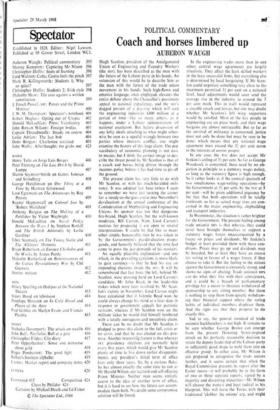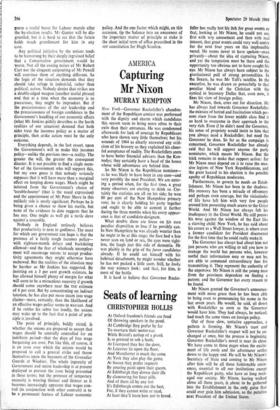Coach and horses limbered up
POLITICAL COMMENTARY AUBERON WAUGII
Hugh Scanlon, president of the Amalgamated Union of Engineering and Foundry Workers (the AEF), has been described as the man with the future of the Labour party in his hands. An extension of this would be to describe him as the man with the future of the trade union movement in his hands. Such high-flown and
emotive language, once employed, elevates the entire debate above the Chancellor's passionate
appeal to national expediency, and the AEF-S
dogged pursuit of a pay-rise which will cost the engineering industries £400 million at a period of time—like so many others. as it happens, under a Labour administration —of national asceticism. But before discussion of any lofty ideals attaching to what might other- wise be seen as a squalid wrangle between two parties whose interests conflict, one might examine the history of this huge claim. The pop vocabulary of economic planning is not easy to master, but I think the correct image to des- cribe the threat posed by Mr Scanlon is that of a coach and horses being driven through the incomes policy before it has had time to get off the ground.
The present claim has very little to do with Mr Scanlon, or with his much-heralded mili- tancy. It was adopted last June (when I seem to remember we were just turning the corner for a steady-as-she-goes cruise into November's devaluation) at the annual conference of the Confederation of Shipbuilding and Engineering Unions. Its sponsor was not that dangerous fire-brand, Hugh Scanlon, but the well-known moderate, Bill Carron. Now. Lord Carron's motives for proposing it are open to several interpretations. It could be that like so many other simple, honourable men he was taken in by the Government's pre-devaluation propa- ganda, and honestly believed that the time had come to press the just demands of his workers. An equally plausible explanation--and one which, in the prevailing cynicism, is more likely to gain currency—is that he had his eye on
impending elections inside the AEU. It will be remembered that last June, the left. behind Mr
Scanlon. were pressing hard on Lord Carron's candidate. Mr John Boyd, in the leadership stakes which were later resolved by Mr Scan- Ion's victory in November. Lord Carron might have calculated that if Johnnie Boyd won, he could always change his mind at a later date in response to government appeals for patriotic restraint, whereas if Mr Scanlon won on the militant ticket he would find himself lumbered with a totally outrageous and unrealistic claim.
There can be no doubt that Mr Scanlon is pledged to press this claim to the full, crisis or no crisis, and that he was elected on this pro-
mise. Another interesting feature is that whereas AEU presidency elections are normally held
every five years, which would give Mr Scanlon
plenty of time to live down earlier disappoint- ments, any president's initial term of office
lasts only three years. So, by a curious fluke, he has almost exactly the same time to run as Mr Harold Wilson, our taciturn and self-effacing Prime Minister. Neither man seems entirely
averse to the idea of another term of office, but it is hard to see how the future can accom- modate them both. No doubt some compromise solution will be found. In the engineering trades more than in any other, central wage agreements are largely ritualistic. They affect the least skilled workers in the least successful firms, but everything else is determined by local bargaining. If Mr Scan- lon could negotiate something very close to the maximum permitted 31 per cent on a national level, local adjustments would soon send the average rise in the industry to around the 7 per cent mark. This in itself would represent a sizeable coach and horses, but one may doubt whether Mr Scanlon's left wing supporters would be satisfied. Most of the key people in engineering are on piece work, and their wage bargains are almost untraceable. But so far as the survival of militancy is concerned, justice must not only be done but must be seen to be done; which means that any national wage agreement must exceed the 31 per cent norm in the interests of amour propre.
In any case, the TUC does not accept Mr Jenkins's ceiling of 31 per cent. So far as George Woodcock is concerned, there need be no ob- jection in principle to a statutory wages policy, so long as the statutory figure is high enough. So it rather looks as if the comical spectacle of two simultaneous wage-vetting operations—by the Government at 31 per cent, by the TUC at 5 per cent--will be given additional piquancy by the fact that both operations will be totally irrelevant, so far as actual wage rises are con- cerned in the major engineering, shipbuilding and transport industries.
In Westminster, the situation is rather brighter for the Government. The present feeling among trade unionist NiPs is that whereas they could never have brought themselves to support a statutory wages freeze unaccompanied by a freeze on prices and dividends. -Mr Jenkins's budget at least provided them with these con- ditions. Prices may go up and dividends may be hoarded, but at least they have an excuse for voting in favour of a wages freeze, if they choose to take it. But the feeling in the unions against the Government is extremely strong, and shows no signs of abating. Trade unionist Num can do what they like with their consciences, and it could be a breach of parliamentary privilege for a union to threaten withdrawal of sponsorship to any sitting member. But there is nothing to stop them from quietly withdraw- ing their financial support where the voting habits of individual members displease them. And the signs are that they propose to do exactly this.
Sad to say, the general standard of trade unionist backbenchers is not high. It remains to be seen whether George Brown can emerge from the present Downing Street-inspired attack on his perfectly reasonable decision to retain the deputy leadership of the Labour party in sufficiently good shape to weld them into an effective group. In either case, Mr Wilson is not prepared to antagonise the trade unions further, and it seems certain that when the Royal Commission presents its report after the Easter recess—it will probably be in the form of two or three separate reports, signed by a majority and dissenting minorities—Mr Wilson will choose the wettest and least radical as his blueprint. This will leave the Tories with their traditional 'clobber the unions' cry, and might
prove a useful boost for Labour morale after the by-election results. Mr Gunter will be dis- gruntled, but it is hard to see that the future holds much gruntlement for him in any case.
Any political initiative by the unions tends to be hamstrung by their deeply ingrained belief that a Conservative government would be worse. Not all the cooing noises of Mr Robert Carr nor the eloquent outpouring of Mr Powell will convince them of anything different. So the logic of the situation demands that they should take refuge in industrial, rather than political, action. Nobody denies that strikes are a double-edged weapon (another useful phrase) and that at a time when the economy is so precarious, they might be imprudent. But if the precariousness of the AE F leadership and the precariousness of foreign confidence in the Government's handling of our economic affairs (what Mr Jenkins pithily describes as the harsh realities of our situation) demand that both sides treat the incomes policy as a matter of principle, then strike action must be the only outcome.
Everything depends, in the last resort, upon the Government's will to make this incomes policy—unlike the previous two—a reality. The greater the will, the greater the consequent disaster. It is not possible to find a single mem- ber of the Government who will support this, but my own guess is that nobody seriously supposes that it will have more than a marginal effect on keeping down wages. Much might be inferred from the Government's choice of 'troubleshooter' (that is the usual expression) and the appointment of Mr Peter Shore in this unlikely role is surely significant. Perhaps he is being given a chance to show his mettle, but none of the evidence to date suggests that he has any. One might as well pit a turtle dove against a crocodile.
Nobody in England seriously believes that productivity is next to godliness. The most for which any government can hope is that the pretence of a fairly tough incomes policy— with eighteen-month delays and backdating allowed—and the fear of wholesale unemploy- ment will encourage unions to accept produc- tivity agreements they might otherwise have eschewed. But the realities of the situation may be harsher as Mr Jenkins has suggested. By insisting on a 3 per cent growth estimate, he has allowed himself plenty of margin for what will seem to be a miraculous recovery if growth should come anywhere near the 'Ivo estimate of 6 per cent. But by concentrating on indirect taxation, he has also put more steam into wage claims—more, certainly, than the likelihood of an effective wages policy seems to warrant. And if he rattles his sabre too loudly, the unions may wake up to the fact that a point of prin- ciple is involved.
The point of principle, baldly stated, is whether the unions are prepared to accept that wages should be centrally controlled for an indefinite period—that the days of free wage bargaining are over. Put like this, of course, it is an issue over which the unions would be prepared to call a general strike and throw themselves upon the bayonets of the Grenadier Guards at Windsor. The whole ingenuity of Government and union leadership is at present deployed to prevent the issue being presented in these terms; but the pretence of temporary necessity is wearing thinner and thinner as it becomes increasingly apparent that wages con- trol (in conjunction with other controls) is to be a permanent feature of Labour economic
policy. And the one factor which might, on this occasion, tip the balance into an awareness of the important matter of principle at stake is the short initial term of office prescribed in the AEF constitution for Hugh Scanlon.







































 Previous page
Previous page